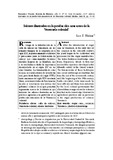| dc.rights.license | http://creativecommons.org/licenses/by-nc-sa/3.0/ve/ | |
| dc.contributor.author | Molina, Luis E. | |
| dc.date.accessioned | 2017-12-14T15:05:56Z | |
| dc.date.available | 2017-12-14T15:05:56Z | |
| dc.date.issued | 2017-12-14T15:05:56Z | |
| dc.identifier.issn | 1316-1369 | |
| dc.identifier.uri | http://www.saber.ula.ve/handle/123456789/44260 | |
| dc.description.abstract | Luego de la introducción de la
caña de azúcar en Venezuela, en los
primeros tiempos de la conquista en el
siglo XVI, la planta comenzó a cultivarse
y procesarse para la fabricación de
azúcar. Los conocimientos técnicos
iniciales llegaron de La Española, que
a su vez había recibido la experiencia
desarrollada en el siglo XV en las
islas Canarias. La transmisión de estas
técnicas se realizó a través de la tradición
oral, pero desde finales del siglo XVII y
hasta comienzos del siglo XIX circularon
libros, ocurrieron visitas de funcionarios
locales y existieron iniciativas del
gobierno colonial local que permiten
argumentar acerca de la influencia que
tuvieron los saberes ilustrados en las
prácticas agrícolas y en particular en la
producción azucarera de la Venezuela
colonial. | es_VE |
| dc.language.iso | es | es_VE |
| dc.rights | info:eu-repo/semantics/openAccess | |
| dc.subject | Caña de azúcar | es_VE |
| dc.subject | Venezuela colonial | es_VE |
| dc.subject | Saberes ilustrados | es_VE |
| dc.title | Saberes ilustrados en la producción azucarera de la Venezuela colonial | es_VE |
| dc.title.alternative | Enlightened Knowledge and Sugar Production in Colonial Venezuela | es_VE |
| dc.type | info:eu-repo/semantics/article | |
| dc.description.abstract1 | After the introduction of sugar
cane in Venezuela, in the early days of
the conquest in the sixteenth century,
the plant began to be cultivated and
processed for the sugar manufacture.
The initial technical knowledge came
from Hispaniola, which in turn had
received the experience developed in the
fifteenth century in the Canary Islands.
The transmission of these techniques
was carried out through oral tradition, but
from the end of the seventeenth century
until the beginning of the 19th century,
books circulated, visits were made by
local officials and there were initiatives
by the local colonial government that
allowed them to argue about the influence
they had on the knowledge illustrated in
agricultural practices and in particular
in the sugar production of colonial
Venezuela. | es_VE |
| dc.description.colacion | 44-62 | es_VE |
| dc.description.email | lemolinac@gmail.com | es_VE |
| dc.description.frecuencia | semestral | |
| dc.identifier.depositolegal | 196602ME301 | |
| dc.identifier.eissn | 201202ME4038 | |
| dc.publisher.pais | Venezuela | es_VE |
| dc.subject.facultad | Facultad de Humanidades y Educación | es_VE |
| dc.subject.keywords | Sugar cane | es_VE |
| dc.subject.keywords | Colonial Venezuela | es_VE |
| dc.subject.keywords | Illustrated knowledge | es_VE |
| dc.subject.publicacionelectronica | Revista Presente y Pasado | |
| dc.subject.seccion | Revista Presente y Pasado: Artículos | es_VE |
| dc.subject.thematiccategory | Artes y Humanidades | es_VE |
| dc.subject.tipo | Revistas | es_VE |
| dc.type.media | Texto | es_VE |


